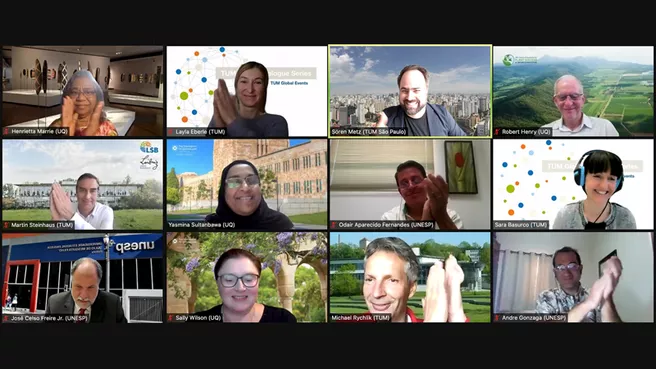Researchers worldwide are increasingly addressing the global problem of food security. In doing so, they are striving for solutions that support goals such as "zero hunger," responsible production for a conscious consumer society, and sustainable rural living. At the TUM São Paulo Dialogue, speakers shared insights into the latest research and debated the future of food and nutrition, using examples from Australia, Europe, and South America.
Traditional methods as the basis for the future of nutrition
The researchers agreed on the need to develop new or rediscovered traditional, nutrient-rich food sources with the potential for broad health and nutrition applications.
Prof. Henrietta Marrie, Honorary Professor of the Australian Research Council (ARC) Training Centre for Uniquely Australian Foods at UQ, specifically highlighted traditional harvesting methods in Australia, Asia, and Latin America.
Food crops not yet commercially utilized were the hot topic of André Gonzaga dos Santos. In his presentation, the professor from the International School of Pharmaceutical Sciences at UNESP introduced, among other things, potential new superfoods from Brazil.
Prof. Michael Rychlik, Chair of Analytical Food Chemistry at the TUM School of Life Sciences, is also dedicated to this area. Together with a group of researchers from Australia and Brazil, he is currently analyzing the vitamin content of traditional plants, which could also include one or two new superfoods.
The perfect recipe: nutritious, delicious, regional
For the research of Dr. Martin Steinhaus from the Leibniz-Institute for Food Systems Biology at TUM , the flavor aspect is the main focus: "It is important to involve consumers from the very beginning when it comes to new and natural raw materials." In his flavor research, he therefore focuses on this target group. After all, a new, sustainable food source will only be accepted by consumers if it tastes pleasant.
The ideal foods ought to be healthy and taste good. But where should they come from? In a survey of the nearly 80 participants in the TUM Global Dialogue, a majority saw the future of food in regional sourcing and urban gardening, as well as the circular economy. Around 70% of the audience said that they still get most of their food from supermarkets rather than directly from local producers.
Possible follow-up at the symposium in Straubing
This exciting discussion may be continued in 2022 at the next symposium of the Global Bioeconomy Alliance at the TUM Campus Straubing. After the pandemic-related two-year break, the symposium will finally take place again next year and bring together scientists from Australia, Brazil and Germany for a valuable exchange of the latest findings from three continents.
About the GBA
The Global Bioeconomy Alliance was founded in 2018 by TUM, the University of Queensland (UQ), and São Paulo State University (UNESP). Learn more
